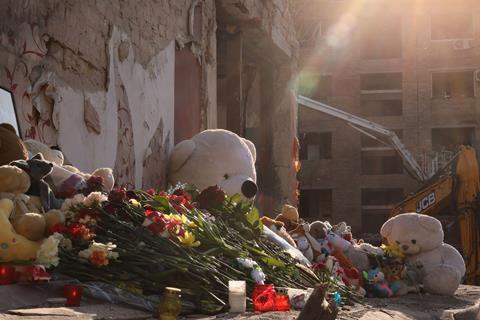During the first Ukraine Law Day, participants discussed how Russia can be made to pay for its war. But fears were also voiced that justice could be traded away as part of any peace deal

Could justice be traded off in a Trumpian deal to end the war in Ukraine? The grim possibility was raised early at the inaugural Ukraine Law Day, a gathering of experts held on 28 April organised by the Bar Council to discuss the legal aspects of Ukraine’s reconstruction – and how Putin’s Russia can be made to pay for the destruction it has wrought.
‘In the past couple of months, it has looked at times that justice might not be done; it looked like civil justice would be part of the trade for finishing this war,’ former attorney general Victoria Prentis KC said in a keynote speech. ‘That is very troubling.’ But the barrister and former MP, who is currently helping to train Ukrainian judges to prosecute, defend and try war crimes cases, was the first of a series of distinguished speakers to commit to securing justice through a multiplicity of channels.
The challenge is formidable. Since Russia’s invasion, 160,000 war crimes have been documented, Prentis said. Some 14,400 civilians have been killed and 850 suspects identified. At least 20,000 cases of forced displacement of children have been documented. ‘We think there may be more,’ Prentis added. Other documented crimes include environmental offences – including ecocide – cyber-attacks and widespread sexual violence. ‘There is evidence of systematic sexual abuse against prisoners of war,’ she said.
While ‘99.9% of war crimes cases will rightly be prosecuted in Ukraine by Ukrainian prosecutors in Ukrainian courts’, international efforts will be vital – particularly over the crime of aggression, Prentis said. At the moment, no mechanism exists for prosecuting the ‘troika’ of individuals responsible for the war: ‘We need a special commission on the crime of aggression to close this gap.’
When it comes to civil claims over war damages, the event heard of several efforts to make Russia – eventually – pay. One is the Council of Europe’s Register of Damage Caused by the Aggression of the Russian Federation Against Ukraine (RD4U). The register is paving the way for claims ‘on a mass scale for millions and millions of people and thousands of entities’, lawyer Markiyan Kliuchkovskyi, director of RD4U, said.
'In the past couple of months, it has looked at times that justice might not be done; it looked like civil justice would be part of the trade for finishing this war. That is very troubling'
Victoria Prentis KC, former attorney general
In a novel approach to digital claims management, the register allows Ukrainians to file claims via the government’s digital administration portal, through which more than 70 more conventional government services are handled online. Nine categories of claim are currently open, including ‘loss of life’, ‘torture’ and ‘sexual violence’, along with the more familiar ‘personal injury’. More than 27,000 claims have so far been submitted, Kliuchkovskyi said. The register is also working on a channel for businesses and other legal entities, for example to claim for loss of assets in occupied territories.
The register is only the first component of the project. The next phase will create a claims commission ‘not necessarily a court or a tribunal’ to handle mass claims on an ‘administrative basis’, Kliuchkovskyi said. It may be based on a scheme set up after the 1990 Iraqi invasion of Kuwait. It is due to come into existence next year, absorbing the register.
The snag, of course, is enforcing judgments from such processes on Russia and its institutions. One route that might remain open to businesses is investor-state settlement mechanisms. However, even these ‘are not for the faint of heart’, Sylvia Tonova, partner at international firm Pinsent Masons, told the event, citing potential problems of territoriality and causation. However, causation does not have to be ‘slice and dice’, she suggested. Rather than having to prove, for example, that it was a particular belligerent’s missile which caused the damage, ‘we could take another view of causation – that the whole war was caused by Russian aggression’.
Another possibility is class actions in outside jurisdictions against third parties for complicity with Putin’s Russia. ‘The possibility is much more attractive because of enforceability and access to assets,’ Ned Beale, partner at disputes firm Hausfeld, told the event. As a precedent, he cited Kashef v BNP Paribas, a claim on behalf of 23,000 victims of genocide in Sudan to be heard by a Manhattan jury. The challenge is proving links between the third party’s actions and the war. ‘Provided you can do that, you’ve got a good chance of winning,’ he said.
Meanwhile, around the world 27 countries are conducting their own investigations into Russian war crimes, Prentis said, asserting jurisdiction for example because their own citizens were involved.
‘Keep prosecuting,’ she urged, even in the event of a peace deal. ‘They can trade away Ukraine prosecutions but they can’t trade away prosecutions in the UK or France – that’s why it’s really important that these continue.’




































No comments yet